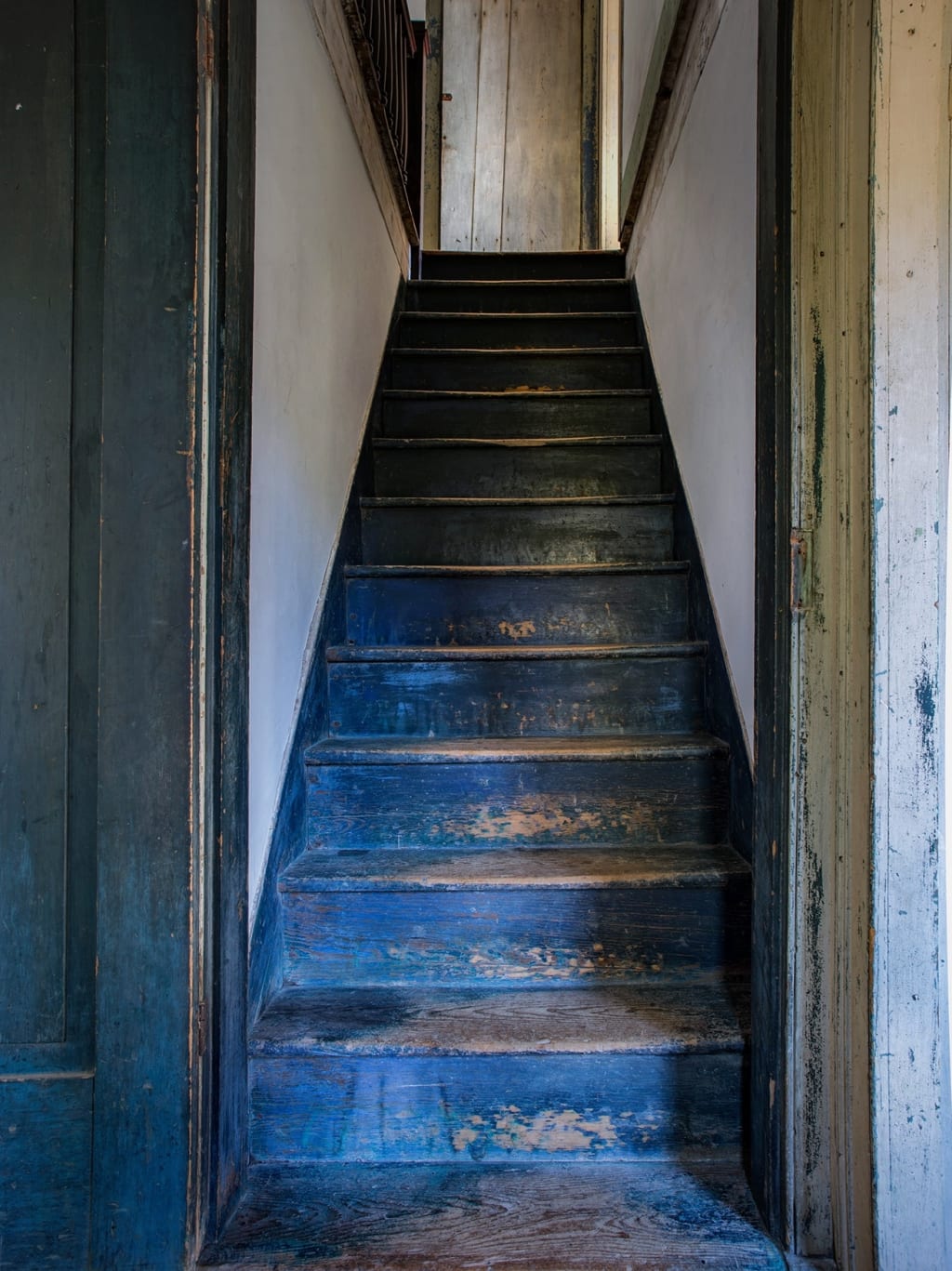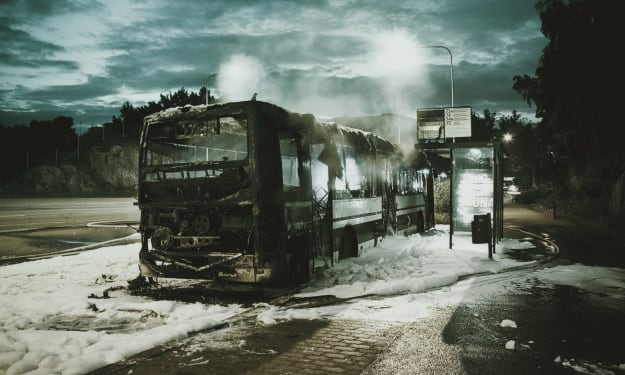
In the cold February twilight, the wreck of the robbery had taken on an artistic effect, the starkness of pen and ink, or perhaps the transparent-to-opaque interface of gouache. That was a word Ted had learned from Aunt Theo, whose secret savings now lay scattered about him like the dead butterflies he had once found in the old summer kitchen. Dreams die if they can’t get out into the world, Theo had told him, lifting one bright, weightless corpse and studying it. She had carried it away to her studio, a teenaged Ted trailing behind in sullen boredom, and made it live again on cold-pressed watercolor paper. She had taught him the meaning of gouache but the deeper message she had tried to impart went unheeded. Ted had no dreams.
The one eye with which he could see the drifts of money cascading from the stairs above him rolled downward with creaky precision, taking in the crooked sprawl of his legs, his feet far away and numb in their thin cotton socks. A little mat of cash bolstered his hips and ribs, meager comfort on the bare planks of the hallway floor--twenty thousand dollars, mostly in tens and twenties, the answer to prayers heard only by the cruel god of luckless gamblers. Sure, Teddy, here it is. All you have to do is take it. He could almost hear the dark chuckle, a sound he imagined to be the twin to Price Nolan’s raspy snigger. Summoned by the thought, the surly casino owner appeared and took a seat on the bottom step, taking care to preserve the sharp crease of his trousers. He eyed Ted with merry contempt.
“Looks like you sure ballsed this one up, sport,” he said. He kicked at the cash on the floor and leaned toward Ted, cigarette fuming between scarred fingers. “I wouldn’t have hurt you so bad. You should have come and talked to me.” Nolan’s laugh was a nicotine-abraded whisper. For just a moment, Ted thought he could detect the smell of the burnt interior of the man’s lungs and then it faded along with the chortling apparition. A teetering twenty-dollar bill slipped from a stair tread and floated to the floor with a sound like thunder. Ted closed his eye and ruminated on the many bad cards in his deck.
Aunt Theo, for whom Ted had been named, lived in solitary splendor on the remnant of the family farm. The house was a modest frame structure thrust against the wintry woods with an intimacy that made it seem part of them. Theo was much like the house, neat and trim without ostentation, comfortable with the wilderness. Comfortable, too, with the creatures that visited and became models for her paintings and sculptures. As a child, Ted had thought of the farm as a bewildering web of enchantments, Theo a sorceress endowed with the power to understand and charm the animals that crept from the endless shadow of the forest. His mother, always close with her sister, had loved their visits, but the silence of the long summer nights had induced a sweat of anxiety in Ted. The millions of simmering stars hanging above the roof felt like watching eyes. They made Ted think of Theo’s eyes, knowing and appraising without a shred of sentimentality. She had never really warmed to him, and he was sure she could see the emptiness inside him. By the time he had grown into his teens, Theo was no longer a sorceress in his mind. She was a witch.
She had a new sculpture student, some man with whom she met every Friday. During one of her infrequent lunches with Ted in the city – they had been getting together every couple of months since his mother had died, out of duty and vague loneliness, Ted supposed - she had shared the news with uncharacteristic enthusiasm. Ted wondered if sculpture was all she and her protege were up to.
“He has such wonderful hands for the work,” she had said. “Strong and fearless, like a surgeon’s.”
Ted imagined some hairy, slump-shouldered beef with a man-bun gripping his aunt’s thin haunches, leaving blue dimples on her pale flesh. The idea was repugnant. Theo, for all her faults, was to him an unassailable icon of icy self-containment.
“He’s probably a murderer,” Ted had scoffed, enjoying the nasty taste of the words. “Probably squeezed the life right out of some poor bastard with those wonderful hands.
Theo’s gaze had grown hooded, receding inward until Ted felt he sat alone at the table. She said, with the intonation of a prophet, “There is in each of us an instinct toward destruction and one toward creativity. The latter must be cultivated. I can tell you, Theodore, vices left unchecked demand greater and greater sacrifices until all we have left to give is our own blood.”
It was not her student she was talking about; her witch’s eyes looked deep into Ted and through him to some unsavory future. Unable to think of a reply to such philosophy, he had been left with the feeling that his aunt had pronounced a black judgement upon him. She dug in her purse and pulled out a key on a long twist of dirty string. Her face expressionless, she offered it to him.
“It’s for the kitchen door. If you need it, use it.” She stood, preparing to leave him with the lunch tab. “For your mother’s sake, try not to need it. She had such hopes for you.”
She had walked away without a backward glance. Despite the coolness in her words, Ted had been emboldened by the gift of the key.
Upon his arrival, he had noted the tracks of animals in the snow, leading from the forest right up to the wide porch—raccoon prints like the hands of goblin children and possum prints shaped like stars. The key, on its greasy length of butcher’s twine, danced and flirted with the lock. Nerves. Not once had he allowed himself to think of his presence there as a prelude to robbery, and yet guilt and furtiveness hampered his fingers. He managed the key in the lock, swung the door open, and entered, glancing over his shoulder like a stage villain.
He hesitated on the kitchen mat. A smell ghosted on the air, smoky vanilla and whiskey, a scent somehow masculine and homey at once. Ted’s gaze followed his nose to a pipe in a glass dish on the table. The copper kettle gleamed on the gas range and two thick mugs had been set out beside a lemon and poppyseed cake on a glass-domed pedestal. Company was expected, and Ted started forward as a sense of urgency touched its spur to him. Habit made him step out of his loafers. He padded through the kitchen, the slick chill of the tile piercing his socks, and made his way to the staircase. Long and narrow, naked polished treads gleaming like ice, it stretched up into an oblong of dim light at its apex. He climbed it with an effort, slipping and clutching at the handrail, shrugging away the anemic shreds of whatever passed in him for familial love. At the top of the stair, he emerged shorn of feeling into the dense, energetic smells of paint and clay. This perfume of inspiration and creative sweat would always be one he associated with his aunt whose wallowing iron frame bed bulked in one corner of the open second floor studio, the quilt and linens in a tangle. A pair of men’s slippers lay on the floor beside it as though kicked off in rough anticipation.
Pain touched him now. It hadn’t before; he had suffered only from the cold seeping up through the old floors, but now he felt its thin, sharp fingers. It was still distant, jabbing at him through the fog of his concussion. He opened the eye not swollen shut and rolled onto his back, a movement of only a few inches that felt like falling from a great height. Broken glass inside him, and the heat of a glass furnace. Air forced from the bellows of his lungs in a hushed scream, lungs locking on the non-sound so he could not draw another breath, shadows encroaching on his limited vision as the ceiling billowed above him like a bedsheet on a clothesline. Good god, what had happened to him?
Price Nolan leaned over him, this time dressed in blue scrubs, a surgeon’s mask hanging at his neck. “Glad you asked, Teddy. Means you’re coming around a bit. You took quite a tumble down those stairs. Lucky you didn’t kill yourself.” Nolan smiled. “And you were worried about what I’d do to you. I’ve been cultivating my creative instinct, Teddy-boy. Even gave up the cancer sticks for this.” He held up a mahogany-colored pipe. “Theo’s been showing me the way. Now let me help you.” The pipe in Nolan’s hand became a glittering scalpel, the winter light running along its length like mercury.
Ted whisper-screamed again into the empty hallway and the pain of it snapped the world taut. The ceiling slammed back into solidity, Nolan was gone, the rush and thunder in his ears shrank into silence. He remembered searching Theo’s studio, looking for the emergency fund he knew she kept. A memory wavered up like a long-drowned thing from deep green water, the sisters arguing about Theo’s safety out here, alone on the farm. “You don’t even lock your doors,” his mother, in exasperation. “And all that cash you keep upstairs. You’re inviting trouble.”
“Everyone should have an emergency fund, something they can lay their hands on at a moment’s notice.” His aunt, placating. “I’ll lock my doors, sweetie, if it’ll make you feel better.”
She had, from then on. The cash in the shoebox, however, was non-negotiable. Theo had never been afraid, certainly not of thieves. Ted, rummaging among the bins of art supplies, found the battered cardboard box on a high shelf behind some jars of gesso. He knelt with it, unknotting the frayed ribbon around it with shaking fingers. Inside, neat stacks of loose cash weighed down by a black notebook. He set the notebook aside and got to counting. When he reached ten thousand, a dew of excited perspiration broke out on his forehead and upper lip. He swabbed his face with his sleeve and kept going. Fifteen thousand. Twenty. He sat back on his heels, his face gone goofy with pleasure. He had finally drawn a good card. This was enough to get him clear.
“I’ll cut out the gambling,” he promised the empty room. “I’ll get clear and I won’t look back.”
Guilt tried to squirm free and savage him, but he was too high on the sight of all that money to feel its bite. Absently, he picked up the black notebook and opened it. Sketches. A man’s hands, long and muscular, the fingers scarred. The sketches were beautiful, but Ted frowned. He turned the heavy, cream-colored pages, horror stamping his expression. Male nudes in repose, in attitudes of arousal, shocking, bawdy celebrations of Theo’s passion. Sketches of Price Nolan. He flung the notebook from him as though burned. With both hands, he snatched up the shoebox with its dilapidated lid askew over the loose sheaves of money and rushed in his sock-clad feet to the stairs.
About the Creator
Liz Zimmers
Liz Zimmers is a writer of dark and speculative fiction. Her stories have been published in numerous anthologies and in two collections, Wilderness: A Collection of Dark Tales (under her former name, Elizabeth Yon) and Blackfern Girls.






Comments
There are no comments for this story
Be the first to respond and start the conversation.